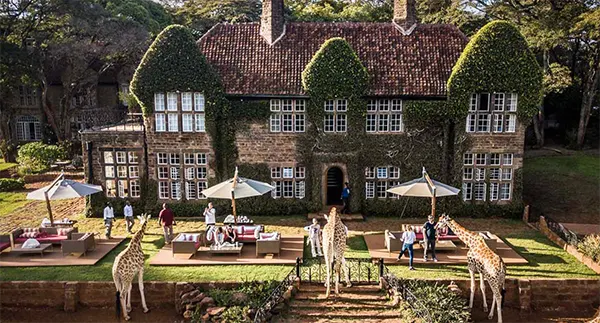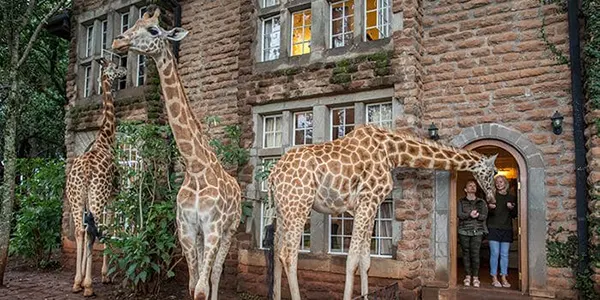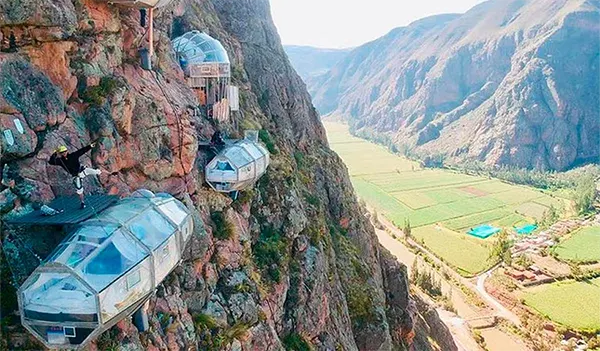
Giraffe Manor in Kenya: Breakfast Companions on Four Legs
In the heart of Lang’ata, a leafy suburb of Nairobi, lies one of the world’s most extraordinary boutique hotels — Giraffe Manor. Here, elegant Rothschild’s giraffes freely roam the property, often poking their heads through the windows to share breakfast with guests. It’s not a fantasy or a curated Instagram illusion — it’s a real, ethical, and unforgettable experience grounded in conservation, history, and hospitality.
What Makes Giraffe Manor Unique?
Giraffe Manor is not just a luxury lodge; it is an iconic establishment deeply intertwined with wildlife conservation. Built in 1932, this colonial-style manor became a giraffe sanctuary in the 1970s, when Jock and Betty Leslie-Melville began rescuing Rothschild’s giraffes, one of the rarest giraffe subspecies on the planet. Since then, the hotel has operated both as a luxury retreat and a support base for the adjacent Giraffe Centre.
What sets Giraffe Manor apart is the seamless coexistence of luxury accommodation and wildlife. While guests enjoy a gourmet breakfast, giraffes wander over, gently nudging for a snack — specially prepared giraffe pellets provided by the staff. The hotel has only 12 rooms, keeping the experience intimate and highly personalised.
Every element of the manor — from antique furniture to sun-drenched verandas — is designed to celebrate Kenya’s colonial heritage and its dedication to preserving the local environment. The property operates sustainably, focusing on low-impact tourism and community involvement.
Interaction with the Giraffes
The giraffes are neither forced nor coaxed into interaction. Their curiosity and social nature draw them toward the manor, where they’ve become comfortable with guests. Feeding them is not only allowed but encouraged — under staff supervision to ensure both animal and guest safety.
Each giraffe has a name and a story. Some were born on the property, others rescued and reintroduced. The hotel staff know each one individually, providing insights into their personalities and habits. This personal approach strengthens the bond between visitors and animals, leaving a lasting emotional impression.
Importantly, the experience is grounded in respect. Guests are briefed on how to interact appropriately and taught about the giraffes’ biology and conservation status. It’s more than a photo opportunity; it’s an educational encounter that fosters empathy and awareness.
Ethical and Environmental Considerations
Giraffe Manor operates under the management of The Safari Collection, which is committed to ethical wildlife tourism. A portion of the profits supports the African Fund for Endangered Wildlife (AFEW), which runs the neighbouring Giraffe Centre. This means that a stay at the manor directly contributes to giraffe conservation.
The hotel uses solar panels, rainwater harvesting systems, and local produce to reduce its environmental footprint. Its eco-conscious operations are a benchmark for similar establishments aiming to combine luxury with responsibility. The property has also eliminated single-use plastics and continues to train staff in sustainable hospitality practices.
Additionally, Giraffe Manor hires locally and supports education programmes in nearby schools. Its community outreach work reflects a broader goal — to integrate tourism into the social and ecological fabric of Kenya, rather than operating separately from it.
Conservation Impact and Research
The Rothschild’s giraffe population once fell below 100 individuals in the wild. Thanks to efforts spearheaded by organisations like AFEW and the Giraffe Conservation Foundation, the number has risen steadily. Giraffe Manor plays a crucial part in this, offering a safe, semi-wild environment where giraffes can thrive and breed.
Ongoing research is conducted on-site, with data shared with national and international wildlife databases. This helps monitor giraffe health, movement patterns, and social structures. The manor’s role as a base for scientific study enhances its importance beyond tourism.
By bridging tourism and science, Giraffe Manor proves that a luxury destination can also be a conservation engine. It invites visitors to become part of the solution — not just passive observers.

Planning Your Visit in 2025
As of February 2025, Giraffe Manor remains one of the most sought-after travel experiences in Africa. Due to its limited number of rooms and growing global interest, bookings must be made several months in advance. The best times to visit are during the dry seasons — January to March and July to October — when the weather is mild and wildlife is most active.
Stays at Giraffe Manor typically include full board, airport transfers, and guided excursions. Many guests combine their visit with safaris to the Maasai Mara or other properties within The Safari Collection. Packages can be customised, and dietary requirements or special occasions are gladly accommodated.
When planning a visit, travellers are advised to fly into Nairobi’s Jomo Kenyatta International Airport and use the hotel’s direct transfer service. All travel documents and vaccinations should be up to date, and guests should review ethical tourism guidelines provided upon booking.
Preparing for the Experience
Travellers should bring casual but respectful clothing, sunscreen, a hat, and a good camera — not just for the giraffes but also for the stunning colonial interiors and lush gardens. Binoculars are useful for birdwatching, and many rooms offer a panoramic view of the surrounding forest.
Guests are encouraged to read up on giraffe conservation and Kenyan wildlife beforehand to fully appreciate the context of their visit. The staff are happy to recommend books and documentaries that deepen the experience.
Ultimately, staying at Giraffe Manor is more than a luxurious break — it’s an immersion into a living, breathing conservation success story. It leaves visitors not only with remarkable memories, but with a renewed sense of global responsibility.




